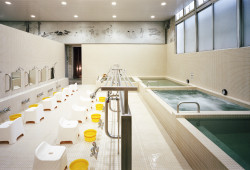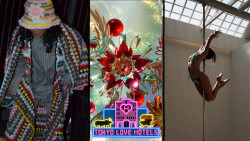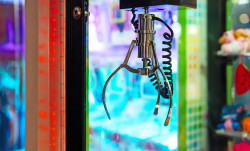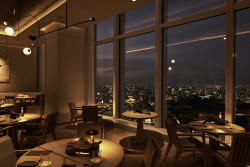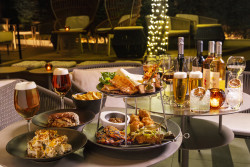
April 21, 2011
All that Glitters is Golden Week
Metropolis picks out some alternative antics to rejuvenate your spirit
By Metropolis
Originally published on metropolis.co.jp on April 2011

Photo by Richard Northcott
Bark

© 2006 suiran green park. All rights reserved.
Apr 29-May 5. Suiran Green Park, Chiba. http://meturl.com/chibadogfest
Spin

Photo courtesy of Spin Matsuri
Hone your spinning action and your clownish tomfoolery on the island of Niijima, Tokyo for Guru-Guru Camp. This fest of themed hoop workshops with related circus-y antics such as poi and juggling is totally free, though you do have to negotiate the choppy waters on the Takeshiba ferry (¥6,000 one way; 10 hours), or the Jetboat ferry (¥9,000 one way; three hours). Stay one night or all week and get some exercise and relaxation—and put a definite spring in your step.
April 28-May 5. Email: spinmatsuri@gmail.com. http://spinmatsuri.com/guru-guru-camp
Pounce

© iga ueno ninja festa zikkouiinkai
Make like a teenage mutant turtle down in Iga Ueno, Mie Prefecture, for the final leg of the five-week Ninja Festa. Ninja-themed events swamp the city, and you can even travel for free on all Iga town trains—if you wear a ninja costume. An estimated 30,000 visitors come down to practice lethal shadowy techniques, and the Mayor and city council even dress up for an annual Ninja Congress.
Until Apr 30. http://meturl.com/ninjafest11
Sip
Showa Day is the time to celebrate the picking of new tea at the Sayama Tea Festival. Sip on fresh hand-ground ocha from this famous tea-producing region and aspire for some serenity after all the recent tumultuous events. There is a traditional tea ceremony and distribution of free flowers and seedlings to plant the idea of new beginnings. Teas, sweets, flowers and staff dressed in green tea uniforms. How could it not be relaxing?
Apr 29, 9am-3pm. 1-23-5 Irimagawa, Sayama City Rotary, Saitama. Tel: 04-2953-1111. Nearest stn: Seibu Sayama. http://meturl.com/sayamateafest
Transcend
The Foundation for Shamanic Studies is offering six days of English courses in Tokyo, starting with The Way of the Shaman basic two-day course—initiating you into shamanic journeying, aided by drumming and other techniques—followed by the advanced courses Extraction Healing Training, and Shamanism: Dying and Beyond. The latter is obviously the culmination—you can’t let just anybody into the “after-death realms.” Each course will set you back ¥33,000, while you can nab all three for ¥93,000. A small price for immortality.
Apr 30-May 5. Tel: 075-723-4379 / 050-1431-3293. www.shamanism-asia.com/en
Off the Beaten Park
Discover Western Tokyo’s more obscure parks[slideshow id=20 w=650]
Shakujii Park
Tokyo’s birdwatchers flock to this flora- and fauna-diverse park in the hope of glimpsing its most famous residents: the waterfowl and the kingfisher. For a little workout, row a rental boat to the middle of Shakujii Pond, decorated with colorful large koi nobori (“carp streamers”) for Children’s Day on May 5. Scenic Sanpoji Pond is perfect for existential pondering while observing wannabe artists hone their brushstrokes. Locals hang out at a nearby shack where oden, ramen and curry are served at small, open-air tables.
1-26 Shakujiidai, Nerima. Nearest stn: Shakuji Koen or Kamishakujii.
Zenpukujigawa Park
Shakuji Park’s little brother is rarely trod by foreigners, though its woods and two ponds are teeming with wild birds, including wild ducks and kingfishers. Situated along the Zenpukuji River that streams out of Zenpukuji Pond—which is in turn fed by springs—the park’s natural water is about as clean as you’re going to find anywhere in Tokyo.
3-9-10 Zenpukuji, Suginami. Nearest stn: Nishi-Eifuku or Hamadayama.
Tamagawa Canal
This 40km-long canal dug out in the mid-seventeenth century to supply Edo with water is now a “green road” because of the woods that line its banks. The fresh spring greenery and the mostly traffic-free path that runs alongside the canal are enjoyed by cyclists, joggers and walkers alike. Later in the year, when the azalea, iris and hydrangea are in full bloom, this corner of town becomes a flower paradise.
Runs through Mitaka to Fussa. Nearest stn: Mitaka or Takanodai.
Koganei Park
The second-largest park in the Tokyo Metropolitan area offers an expansive lawn, a sakura garden, an ume tree forest, a sled slope, an archery center, a steam locomotive display and 16 tennis courts. You might have just missed Koganei Park’s 2,000 cherry trees flower—but the bird sanctuary and Edo Tokyo Open Air Architectural Museum will supply you with plenty at which to gaze.
1-13-1 Sekinomachi, Koganei. Nearest stn: Hana-Koganei or Musashi Koganei.
Nogawa Park
It’s easy to see that this park used to be the private golf course of the International Christian University. The large grassy areas broken up by copses of trees, and the Nogawa River running right through it, make this place a popular spot for family outings. Children run around carefree or play in the shallow water of the river. Nogawa Park includes the Nature Observation Center, which contains some in-depth material for the scientifically-minded. Botanists should look out for special wild grasses such as Musashinokisuge and Hitorishizuka.
6-4-1 Osawa, Mitaka. Nearest stn: Shin-koganei.
